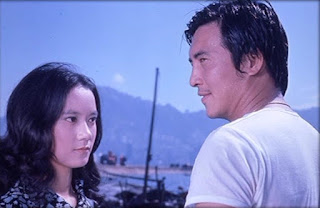What's happening, all of you fight film fans and martial arts afficionados? Hai Karate returns like a bill collector, and we've got a regular little number for you straight from 1973 entitled The Devil's Treasure! This flick comes to you from the Golden Harvest Studios, and features O Chun Hung, Nora Miao, Sammo Hung and Whang In Sik. The direction is handled by noted auteur Cheng Chang-Ho. There's a couple of elements that kind of leave this film outside of your average martial arts flick from that era, elements that speak to where the genre was going in Hong Kong and Asia on a whole at the time. The plot alone is a major key. So without further delay, let's dive into the movie...
The Devil's Treasure begins with a professional scuba diver Wang Chun (Chun Hung) who's based in Hong Kong. He gets approached by few businessmen who have a shady look about them with a proposition. What is it exactly? They want his expertise to help them find something buried deep not too far from the harbor. To be precise, it's a chest that was lost at sea during the retreat of Japanese forces in the final days of World War II. A chest that contains a substantial amount of stolen gold bars. Nothing like wartime treasure to get things kinda interesting, right? Wang Chun agrees after they give him a large amount of cash, and they set sail towards the point where the chest was sunk. Wang dives and finds the chest, but as soon as they bring it aboard, a speedboat arrives out of nowhere. And it's trouble - in the form of Arakawa(Yi Yuen), Kao Hsiung (Sammo), Peng Wai (Yeung Wai) and Tsui Chen Tien(In Sik), decked out in 70's baddie clothes. They kill Wang's boss and force Wang to pilot the boat to shore.
Wang isn't ready for a dirt nap though. He winds up driving the speedboat, but knowing that they're trying to kill him he fights back. The struggle winds up leading the boat to crash upon the rocky shore. Arakawa and his men float to surface, but Wang is nowhere to be seen - he escapes WITH the gold. Fast forward six years, and Wang is living the high life out in the countryside of South Korea with his wife, Yen Yen(Miao) and their daughter, Shen Shen. I mean, he's got a ranch, new car...he's chilling.
But you know this isn't the end of the story. Arakawa and his thugs have tracked Wang and his family down and they're pissed. They want the gold that remains and Wang's life, and won't mind taking out his wife and daughter in the process. And so a taut battle begins for treasure that's tainted by the devil himself...
The Devil's Treasure is one of those post-Bruce Lee Golden Harvest movies where the studio was engrossed in trying to find someone who could fill that space that the iconic star left after his death. O Chun Hung was one of a few leading men Raymond Chow tabbed to see if he could fit the bill. Prior to this, he was kind of a big deal in his native Taiwan, having begun his acting career since the 1960's and winning a Best Actor Award before this movie. He handles himself well here in terms of the action scenes, and emotes enough drama to make you become interested in his character. He'd be tabbed for another Golden Harvest action flick, A Queen's Ransom three years later. For Nora Miao, this was her ninth film overall and it's a bit of a stock dramatic role for her. I gotta say though, the bad guys - especially Whang In Sik with that wild black leather trenchcoat and shades combo he sports throughout - do help drive the story along. The movie does plod a bit but their action scenes with Hung do grab you. They're quickly paced and choreographed well - another nod goes to Sammo Hung for that direction, which he was getting more and more famous for at this time. Although I gotta say, that mustache and mullet combo he rocks in this film did have me crack up at certain moments. He looked like he was gonna do some bass work for Sonny Bono on his down time. But I get that it's the "Japanese tough guy" look. And Cheng Chang-Ho's work on this film makes it a riveting drama when it gets going - but those scenes are more like bookends rather than them being distributed evenly throughout the film. (Side note: those action sequences I told you about? They were intricate enough that according to press at the time, both Hung & Miao sustained injuries and a cinematographer died during filming.)
The Devil's Treasure is one of those flicks that kind of lean more towards the thriller drama, but it's decentenough for a quick viewing when you've got time to fill and if you want to see how Asian cinema handled noir elements in the 1970's. It would also be a film that pointed the way for Golden Harvest to continue to appeal to movie audiences with more modern themes and move away from the wu xia films that used to be dominant (and were admittedly still the prime domain of their rivals in the Shaw Brothers Studios). You can check it out via DVD through Joy Sales and Fortune Star.
RATING: THREE OUT OF FIVE DRAGON PUNCHES












